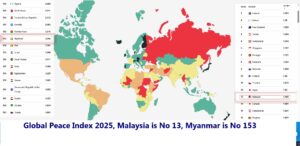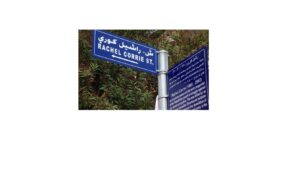Doing What Is Right and Forbidding What Is Wrong: A Reflection on a Core Islamic Principle
The principle of enjoining what is right and forbidding what is wrong is a fundamental teaching in Islam. It calls upon every Muslim to uphold justice, guide others toward good, and reject evil—with sincerity, humility, and wisdom.
A Prophetic Responsibility
The Prophet Muhammad (peace be upon him) said:
“Whoever sees something wrong should change it with his hand. If he cannot, then with his tongue. If he cannot, then with his heart—and that is the weakest form of faith.” (Sahih Muslim)
Burmese translation:
“အသင်တို့အနက် မည်သူမဆို စက်ဆုပ်ရွံရှာဖွယ်အမှုကို မြင်ရလျှင် မိမိ၏လက်ဖြင့် ပြုပြင်လော့။ မပြုပြင်နိုင်လျှင် မိမိ၏နှုတ်လျှာဖြင့် ပြုပြင်လော့။ ထိုသို့လည်း မပြုပြင်နိုင်ပါက မိမိနှလုံးသားဖြင့် ပြုပြင်လော့။ ဤသည် ယုံကြည်မှု၏ အားနည်းဆုံးအခြေအနေဖြစ်သည်။”
This layered responsibility reflects the varying capacities of individuals while maintaining the spiritual duty of addressing wrongdoing.
The Qur’anic Foundation
The Qur’an reinforces this obligation in several verses:
- Surah 3:110 – “You are the best nation raised for mankind: you enjoin what is right, forbid what is wrong, and believe in Allah.”
- Surah 3:104 – “Let there be among you a group that calls to goodness, enjoins right, and forbids wrong. These are the successful.”
- Surah 9:71 – “The believing men and believing women are allies of one another. They enjoin what is right and forbid what is wrong.”
- Surah 7:157 – Refers to the Prophet who “commands them to do right and forbids them from wrong.”
These verses lay a clear foundation for proactive moral responsibility in both individual and communal life.
Practical Application and Ethical Boundaries
Though the obligation is clear, its application varies based on one’s position and capacity:
- Ordinary believers may feel limited in ability—but even disapproval in the heart is an act of faith.
- Children and youth must be respectful when correcting elders.
- Criticizing authorities must be done cautiously, without inciting harm.
- Spying or public humiliation is not permitted—private, respectful advice is encouraged.
- Religious enforcers should not exceed their limits; legal penalties belong to the state.
- Migration or avoidance is acceptable when direct action is not possible.
Warning Against Hypocrisy
One of the strongest warnings comes from a hadith:
A man will be thrown into Hell, his entrails spilled, turning like a donkey around a millstone. When asked, “Did you not command good and forbid evil?” he will reply, “Yes, but I did not do it myself.” (Sahih Muslim 2989)
And in the Qur’an:
“Do you enjoin righteousness upon others while forgetting yourselves, even though you recite the Scripture? Do you not reason?” (Surah Al-Baqarah 2:44)
This is a warning against hypocrisy, not a rejection of the duty itself. Integrity between word and action is essential.
Individual and Collective Duty
- Fard al-Kifayah (communal duty): If some members of the community fulfill it, others are absolved.
- Fard al-Ayn (individual duty): Obligatory upon every Muslim when personally encountering a wrong.
Together, these obligations form the foundation of Islamic moral activism—blending individual conscience with social responsibility.
Conclusion
To enjoin right and forbid wrong is not merely a slogan—it is a call to live out faith in everyday life. It must be approached with humility, consistency, and care. Whether through action, speech, or heartfelt disapproval, Muslims are called to stand for truth and justice.
In an age of global injustice and moral confusion, this timeless Islamic ethic offers a clear and compassionate guide. Let us practice what we preach, call others with kindness, and help build communities rooted in righteousness and mercy.
Quranic examples
- Sura 3.110 translated by Abdullah Yusuf Ali

Ye are the best of peoples, evolved for mankind, enjoining what is right, forbidding what is wrong, and believing in Allah. If only the People of the Book had faith, it were best for them: among them are some who have faith, but most of them are perverted transgressors.

Let there be people among you, who invite to the best [in religion]; and command that which is just, and forbid that which is evil; and they shall be happy.Transliteration:Waltakun minkum ommatun yadAAoona ila alkhayri waya/muroona bilmaAAroofi wayanhawna AAani almunkari waola-ika humu almuflihoon

“Those who follow the apostle, the unlettered Prophet, whom they find mentioned in their own (scriptures), – in the law and the Gospel; – for he commands them what is just and forbids them what is evil; he allows them as lawful what is good (and pure) and prohibits them from what is bad (and impure); He releases them from their heavy burdens and from the yokes that are upon them. So it is those who believe in him, honour him, help him, and follow the light which is sent down with him, – it is they who will prosper.”Transliteration:Allatheena yattabiAAoona alrrasoola alnnabiyya al-ommiyya allathee yajidoonahu maktooban AAindahum fee alttawrati waal-injeeli ya/muruhum bialmaAAroofi wayanhahum AAani almunkari wayuhillu lahumu alttayyibati wayuharrimu AAalayhimu alkhaba-itha wayadaAAu AAanhum israhum waal-aghlala allatee kanat AAalayhim faallatheena amanoo bihi waAAazzaroohu wanasaroohu waittabaAAoo alnnoora allathee onzila maAAahu ola-ika humu almuflihoona

And the faithful men, and the faithful women are friends one to another: They command that which is just, and they forbid that which is evil; and they are constant at prayer, and pay their appointed alms; and they obey God, and his apostle: Unto these will God be Merciful; for He [is] Mighty [and] Wise.





